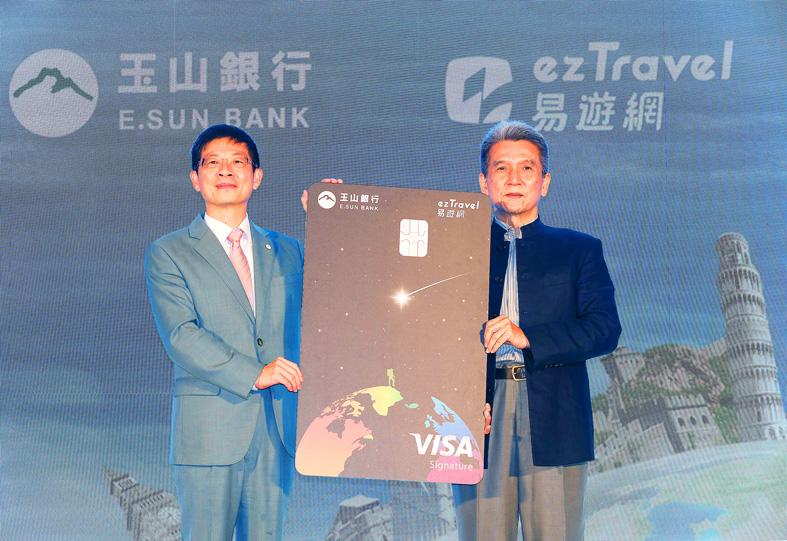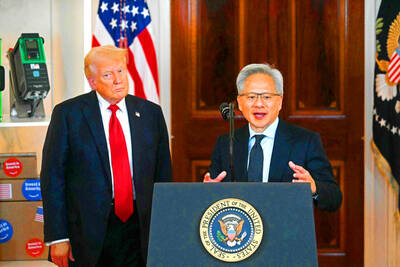E.Sun Commercial Bank (玉山銀行) and ezTravel Co (易遊網) yesterday launched a cobranded credit card on expectations that credit card spending by Taiwanese during overseas travel would rebound later this year or early next year.
It is the nation’s first cobranded card introduced by a bank and an online travel agency.
E.Sun expects ezTravel, the nation’s largest travel platform with more than 2 million active users, to help expand its client base, E.Sun Commercial Bank chairman Joseph Huang (黃男州) told a news conference in Taipei.

Photo: CNA
The platform has diverse product offerings, such as airline and cruise tickets, and accommodation and travel programs, so partnering with ezTravel meets the bank’s goal of offering one-stop services to its clients, Huang said.
Asked why the bank did not collaborate with an airline as other banks have, E.Sun credit card and payment division vice president Sean Lin (林榮華) said that flying is just one way of traveling.
CTBC Bank (中國信託銀行) has partnered with China Airlines Ltd (CAL, 中華航空), and Cathay United Bank (國泰世華銀行) is collaborating with EVA Airways Corp (長榮航空) to offer joint services.
E.Sun said that people can earn eMoney points for many kinds of purchases on ezTravel and use them for their next transaction on the platform, with one point worth NT$1.
“Overall, this credit card is suitable for those who love travel. Reward rates are set at 8 percent for purchases of airline tickets or accommodation. They can be even 10 percent for new clients.” Huang said.
While domestic travel has fully recovered in western Taiwan, overseas travel by Taiwanese might not return to pre-pandemic levels this year due to border controls and a weekly arrival limit of 40,000 set by the government, Lin said.
“However, we need to adopt a forward-looking strategy for the credit card business, as there are signs of a rebound in demand for overseas travel. It is possible that international travel would fully recover next year,” Huang said.
E.Sun has over the past few years issued innovative credit cards to satisfy its clients’ needs. Last month, it issued the nation’s first digital credit card, which consists only of a number and not a physical card.
“Surprisingly, the digital card was received better than our expectations and we have issued about 50,000 cards. That might be because just a few channels or shops accept only physical cards,” Huang said.
Credit card spending in the nation totaled NT$258 billion (US$8.6 billion) in May, up 7.8 percent monthly and 7.6 percent annually, as consumers spent more at supermarkets and hypermarkets, and used credit cards to pay taxes, Financial Supervisory Commission data showed on Thursday.
Cathay United Bank ranked first in terms of credit card payments with NT$43.96 billion, followed by CTBC Bank with NT$40.41 billion and E.Sun Bank with NT$35.22 billion, the data showed.
In the first five months of this year, credit card spending totaled NT$1.28 trillion, up 5 percent from a year earlier, the data showed.
The figure was also the highest for the five-month period since 2019, as people spent more on online shopping and food deliveries, as well as travel and accommodation, despite the COVID-19 pandemic, the commission said.
The data indicated that people maintained their normal spending habits while coexisting with the virus, Banking Bureau Deputy Director-General Roger Lin (林志吉) said on Thursday.

Taiwan Semiconductor Manufacturing Co (TSMC, 台積電) last week recorded an increase in the number of shareholders to the highest in almost eight months, despite its share price falling 3.38 percent from the previous week, Taiwan Stock Exchange data released on Saturday showed. As of Friday, TSMC had 1.88 million shareholders, the most since the week of April 25 and an increase of 31,870 from the previous week, the data showed. The number of shareholders jumped despite a drop of NT$50 (US$1.59), or 3.38 percent, in TSMC’s share price from a week earlier to NT$1,430, as investors took profits from their earlier gains

AI TALENT: No financial details were released about the deal, in which top Groq executives, including its CEO, would join Nvidia to help advance the technology Nvidia Corp has agreed to a licensing deal with artificial intelligence (AI) start-up Groq, furthering its investments in companies connected to the AI boom and gaining the right to add a new type of technology to its products. The world’s largest publicly traded company has paid for the right to use Groq’s technology and is to integrate its chip design into future products. Some of the start-up’s executives are leaving to join Nvidia to help with that effort, the companies said. Groq would continue as an independent company with a new chief executive, it said on Wednesday in a post on its Web

CHINA RIVAL: The chips are positioned to compete with Nvidia’s Hopper and Blackwell products and would enable clusters connecting more than 100,000 chips Moore Threads Technology Co (摩爾線程) introduced a new generation of chips aimed at reducing artificial intelligence (AI) developers’ dependence on Nvidia Corp’s hardware, just weeks after pulling off one of the most successful Chinese initial public offerings (IPOs) in years. “These products will significantly enhance world-class computing speed and capabilities that all developers aspire to,” Moore Threads CEO Zhang Jianzhong (張建中), a former Nvidia executive, said on Saturday at a company event in Beijing. “We hope they can meet the needs of more developers in China so that you no longer need to wait for advanced foreign products.” Chinese chipmakers are in

POLICY REVERSAL: The decision to allow sales of Nvidia’s H200 chips to China came after years of tightening controls and has drawn objections among some Republicans US House Republicans are calling for arms-sale-style congressional oversight of artificial intelligence (AI) chip exports as US President Donald Trump’s administration moves to approve licenses for Nvidia Corp to ship its H200 processor to China. US Representative Brian Mast, the Republican chairman of the US House Committee on Foreign Affairs, which oversees export controls, on Friday introduced a bill dubbed the AI Overwatch Act that would require the US Congress to be notified of AI chips sales to adversaries. Any processors equal to or higher in capabilities than Nvidia’s H20 would be subject to oversight, the draft bill says. Lawmakers would have